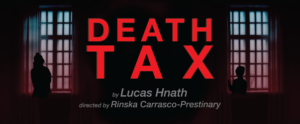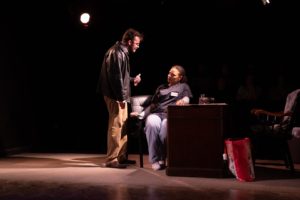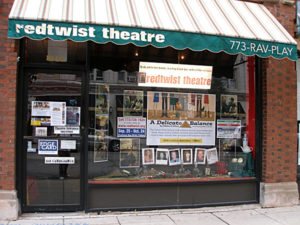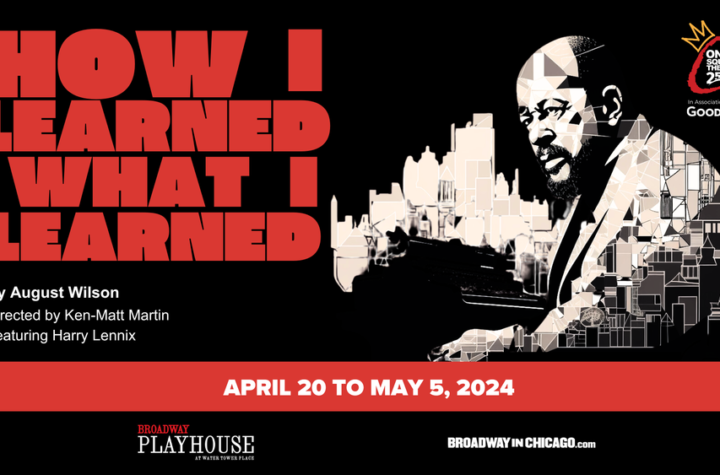
 [rating=5]Deep, dark, and distressing, “Death Tax” is a shockingly astute take on the role of love versus money when a close relative requires necessary healthcare. The immediate story is about an elderly woman’s demand for skilled nursing at a time in her life when she is the most dependent and helpless: during a serious illness close to the point of dying.
[rating=5]Deep, dark, and distressing, “Death Tax” is a shockingly astute take on the role of love versus money when a close relative requires necessary healthcare. The immediate story is about an elderly woman’s demand for skilled nursing at a time in her life when she is the most dependent and helpless: during a serious illness close to the point of dying.
With incredible casting, meticulous acting, and a tight, smart script, this realistic drama takes place in five scenes; the first four being in 2010 and the last in 2030. We come to understand that in 2010, it was necessary to have the best doctors available to prolong life. By 2030, the requirement was to have the best machines available. That said, the thrust of the play does not have to do with the quality of healthcare per se but rather the nexus of strained relationships—personal and professional—surrounding difficult medical decisions in the context of end-of-life care.
The elderly Maxine (Georgia Buckner) resides in an upscale nursing home. As her health declines, family and nursing staff have different ideas about how to deal with her and her circumstances. Everybody raises questions about where her money is coming from to take care of her needs. Then too, where is the money going—and where should it go instead? Does (or should) one generation have a hold on another generation’s money—and a potential inheritance?
When Congress failed to plug the 2010 tax loophole, it unintentionally created a situation where some beneficiaries would have to pay more inheritance taxes to the government in the event that their loved one should pass away on January 1, 2011 or sometime thereafter. This detail thus becomes the basis for playwright Lucas Hnath’s story. In mid-December of 2010, Maxine’s daughter (Maria Stephens) is in line to inherit some large portion of her mother’s over $5 million estate. However, since the two of them got into a bad fight over the phone two weeks prior, the mother believes that her daughter is out to kill her so as to inherit the maximum amount possible before January 1st. So Maxine tries to ensure, as best she can, to live into the next year, so that a significantly larger portion of her money would go to the government on her death rather than to her spiteful daughter.
 There are no evil characters here: just self-interested people who seek to exploit other people’s vulnerabilities—through guilt, worry, fear, and anger—in order to achieve their personal goals. Maxine, for example, fears the progression of her illness and a certain death. Nurse Tina (Brooke Reams) wants to provide a good life for her young son after her divorce and will do almost anything to achieve that outcome. Todd, the nursing home administrator (Alex Ireys), has feelings for Tina that she rebuffs; his goal is to draw her closer to him. Charley, the grandson (Alex Ireys) has its own wife and family to take care of and his own personal finances and lifestyle that he wants to preserve. By being consumed with their own reality, each becomes blind to the feelings and perspectives of others, and they push their loved ones away. The rare moments of selflessness among the characters are few and far between and are dismissed as being phony—as covering up for one’s true interest, or looking out for Number One. Unconditional love is never expressed except in statements of wanting the best environment possible to raise a small child.
There are no evil characters here: just self-interested people who seek to exploit other people’s vulnerabilities—through guilt, worry, fear, and anger—in order to achieve their personal goals. Maxine, for example, fears the progression of her illness and a certain death. Nurse Tina (Brooke Reams) wants to provide a good life for her young son after her divorce and will do almost anything to achieve that outcome. Todd, the nursing home administrator (Alex Ireys), has feelings for Tina that she rebuffs; his goal is to draw her closer to him. Charley, the grandson (Alex Ireys) has its own wife and family to take care of and his own personal finances and lifestyle that he wants to preserve. By being consumed with their own reality, each becomes blind to the feelings and perspectives of others, and they push their loved ones away. The rare moments of selflessness among the characters are few and far between and are dismissed as being phony—as covering up for one’s true interest, or looking out for Number One. Unconditional love is never expressed except in statements of wanting the best environment possible to raise a small child.
Georgia Buckner enthralls us as Maxine. Her acting is so genuine that you feel that you’ve entered the patient room of a long lost relative. She plays the part of a loveable grump so incredibly well, with a combination of crabbiness and brutal honesty. Then there are moments when she lies in bed so motionless that she doesn’t appear to be real! She evokes the Maxine of newspaper comic fame: deadly serious and perceptive, so much so that it borders on the humorous. But this Maxine is alive to tell us what she really thinks! She runs her mouth with a smirky, snippy, snarky sense of self-importance and moral superiority—and always knows who’s boss!
Another show-stopper is Brooke Reams as a totally convincing Nurse Tina, complete with Haitian accent; and then she turns around and equally convinces us that she is the social worker Candice (with an American accent). In both parts, she is forceful and elegant. Some of her soliloquies as Tina tend towards the melodramatic, yet are necessary to the performance, as they reveal her underlying nature and her motivations. Courtney Orlich deserves a lot of credit as a nurse consultant and coach.
Director Rinska Carrasco-Prestinary has assembled this production well, creating such a cohesive and intimate setting that the audience feels that we have almost intruded on the action. She ensures that the characters wisely use all areas of the compact stage. The efficacy of the set is the work of scenic designer Kerry Lee Chipman and props designer Eren Ahn, who allow us to enter a world of death, dying, and illness that we may or may not already be familiar with.
the compact stage. The efficacy of the set is the work of scenic designer Kerry Lee Chipman and props designer Eren Ahn, who allow us to enter a world of death, dying, and illness that we may or may not already be familiar with.
Getting old or seriously ill is not pleasant or easy. In addition to seeing doctors and dealing with all the medical issues, there are also bills to pay, arguing with insurance companies about coverage, waiting for Medicare payments, and so forth. But it is the social backdrop behind all the healthcare that might be the most difficult aspect of all. It may be the case that some relatives and health and hospital workers may have their own best interests at heart—and not yours. Some may be counting your money while you are still alive. This is compounded by the fact that you may have to deal with wills and trusts and determining amounts of money that you may wish to leave to your heirs (versus the government, in the form of taxes).
Redtwist Theatre’s production of “Death Tax” makes us think about our own plans for end-of-life care and also about life’s uncertainties, such as an unexpected illness, accident, or debility that may affect us or a loved one. It makes us ask ourselves: Who should be assigned to look out for us in our time of need, and how much control should they have? Should this person be a medical professional or a family member or a social worker assigned to the case? Ironically, “Death Tax” provides us with the answer! There is no crystal ball, for nobody knows in advance who might serve best as our patient advocate. Rather, it’s a crapshoot as to which people really do give a damn.
“Death Tax” is playing at the Redtwist Theatre, 1044 W. Bryn Mawr, Chicago, through January 19, 2019.
Thursday 7:30 p.m
Friday 7:30 p.m.
Saturday 7:30 p.m
Sunday, 3:00 p.m.
Tickets are $35 for Thursday night; $40 for Friday and Saturday night and Sunday afternoon.
$5 off for students and seniors.
Tickets are available on-line at https://www.redtwisttheatre.org/ or at the box office.
Call (773) 728-7529 for more information.
 The Redtwist Theatre is located 2 blocks west of Lake Shore Drive, 2 blocks east of the Red Line “L”
The Redtwist Theatre is located 2 blocks west of Lake Shore Drive, 2 blocks east of the Red Line “L”
station. Valet parking for Redtwist is available across the street in front of Francesca’s Bryn Mawr
for most performances—hours vary. Dining is not required. Parking is also available at Edgewater
Mexican Café, with notification of restaurant staff. Dining is not required. Limited free street
parking is available on side streets. There is paybox street parking via ParkChicago.com app. The
paybox is 3-hours on the Redtwist block of Bryn Mawr, and 2-hours on side streets. Paybox
parking is free on Sundays, and after 10:00 p.m. Monday thru Saturday.
To see what others are saying, visit www.theatreinchicago.com, go to Review Round-Up and click at “Death Tax”.







More Stories
“Barefoot in the Park”
“Joe Turner’s Come and Gone”
“How I Learned What I Learned” reviewed by Julia W. Rath